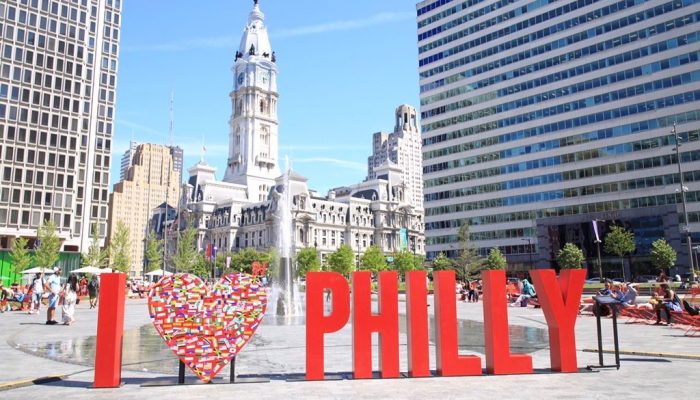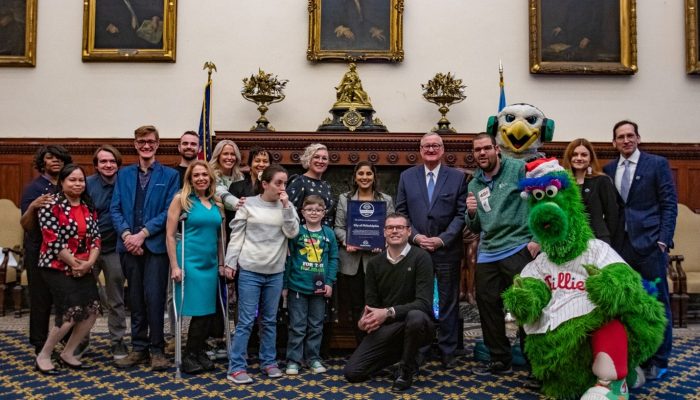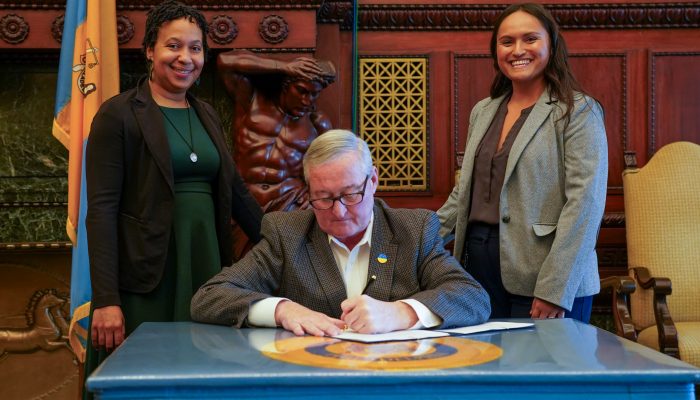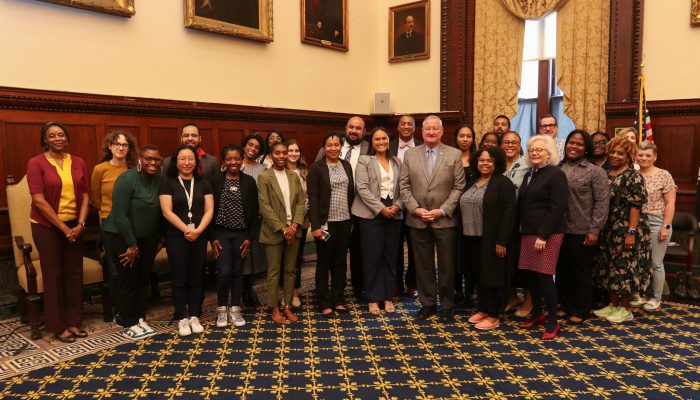A core commitment of the Kenney administration has been to ensure that City government is more diverse, inclusive, and responsive to the needs of all its residents, businesses, and communities.
This commitment to equitable growth envisions a Philadelphia where everyone has the opportunity to thrive, where the City’s prosperity and development benefit all, and where a person’s success is never determined by race, ethnicity, disability, gender, gender identity, sexual orientation, income, or ZIP code.
Investing in equitable and inclusive growth by the numbers
During the last eight years, the Kenney administration has prioritized equity in the process of encouraging the city’s growth. Highlights of this progress since 2016 include:
- Recorded the production and preservation of 57,000 housing units under the City’s 10-year Housing Action Plan, which identifies strategies to house the most vulnerable residents, stop the loss of affordable housing, preserve existing affordable housing, and increase housing opportunities at all income levels.
- Launched PHLRentAssist, which disbursed nearly $300 million to keep families and individuals in their homes during the pandemic, and the ongoing Eviction Diversion Program. Both programs have become national models.
- Launched a comprehensive Inclusive Growth Strategy to drive equitable economic growth across communities in Philadelphia.
- Distributed a total of $46 million in COVID-19 business relief funds beginning in 2020.
- Signed eleven Executive Orders that made sweeping changes to City government to advance diversity, equity, and inclusion in Philadelphia.
- Earned an official designation as a Certified Welcoming city by Welcoming America. Philadelphia became the largest city in the nation to hold this designation.
- Launched the Workforce Diversity Dashboard and Racial Equity Strategy Dashboard, two accountability resources that provide a transparent, accessible way for residents to see the City’s DEI work in action.
- Worked with 39 City departments and offices to date to release their first annual diversity, equity, and inclusion plans, a tool to improve staffing, retain diverse employees, and track the City’s progress toward core DEI goals.
Championing diversity, equity, and inclusion
In 2016, the Kenney administration established the Office of Diversity, Equity, and Inclusion (ODEI), a first-of-its-kind for Philadelphia, to build an inclusive government that reflects the diversity of the communities it serves. The City’s efforts have been made all the more urgent in recent years by the effects of a devastating pandemic and a national reckoning with racial injustice, which has drawn collective attention to the fundamental inequities underpinning many of modern society’s institutions.
Today, the City continues to take tremendous strides toward making Philadelphia a more equitable and accessible place to live and work—and making the city’s institutions more inclusive for all.
Building a diverse workforce
On his first day in office, Mayor Kenney laid the groundwork for Philadelphia’s ongoing commitment to eliminating racial inequities in Executive Order 1-16. The administration later expanded its focus on racial equity through Executive Order 1-20, which outlined Philadelphia’s first-ever Racial Equity Strategy and required all City departments to work with ODEI to complete racial equity assessments and action plans by the end of 2023.
To further this work, the Mayor signed Executive Order 6-23, setting forth a vision for the next phase of the City’s Racial Equity Strategy and committing the City to investing its money and resources more equitably. EO 6-23 commits departments to annual racial equity action planning and makes racial equity an integral part of the budget process. In addition, EO 6-23 established the City’s first Racial Equity Community of Practice allowing greater partnership with employees in the development of the City’s racial equity initiatives.
Taken together, these executive actions adopted a comprehensive and coordinated approach to dismantling institutional barriers that impact marginalized communities, including people of color, LGBTQ+ individuals, women, people with disabilities, and low-income households.
To date, 39 City departments and offices have released their first annual diversity, equity, and inclusion plans, a tool to improve staffing, retain diverse employees, and track the City’s progress toward core DEI goals.
The City has launched two accountability resources that provide a transparent, accessible way for residents to see this work in action.
- The Workforce Diversity Dashboard is a tool to allow City leaders, residents, employees, and members of the public to explore the racial, ethnic, and gender composition of the City of Philadelphia’s municipal workforce.
- The Racial Equity Strategy Dashboard provides annual updates on departments’ racial equity strategies to show what steps are being taken to eliminate racial disparities in all areas of City government.
Budgeting for Racial Equity
A key part of the City’s Racial Equity Strategy calls for ongoing investments that provide quality government services and infrastructure, while also maintaining the City’s long-term fiscal health, reducing racial disparities among Philadelphians, and advancing equitable outcomes for all.
Over the last four years, the City’s budget process has expanded to include racial equity questionnaires, community engagement sessions, and input from ODEI to better inform decisions about day-to-day operating costs and long-term infrastructure investments. The Budgeting for Racial Equity initiative gives residents and City employees the opportunity to help the Budget Office and the Mayor identify top racial equity priorities for Philadelphia.
As a result of these actions, the administration has made significant investments in initiatives with an explicit focus on racial equity, including:
- $11 million in FY24 for the construction of two new Health Centers in the northeast area of Philadelphia
- $31 million to subsidize free transit for Philadelphia residents at or near the poverty level in FY24
- More than $233 million to reduce or prevent violence, which includes $14.7 million for forensics operations and $9.2 million for Operation Pinpoint to decrease violent incidents in the neighborhoods of Philadelphia experiencing the highest crime rates
- $37 million over five years to allow the Free Library system to sustain more regular hours following closures during the pandemic.
- $282 million for the School District of Philadelphia in FY24, including comprehensive and free internet access to K-12 low-income families who have historically experienced disparities in connectivity. The Kenney administration has allocated a total of $1.5 billion in additional local funding for public education since Fiscal Year 2018, and the FY24 commitment represents an increase of 171 percent over the mayor’s first year in office.
Exemplifying a Welcoming City
Language access for all
The City’s commitment to equity and inclusion extends to making Philadelphia a welcoming place for everyone. Immigrants make up about 15 percent of Philadelphia’s population, and they are central to Philadelphia’s economic growth and productivity, as well as its cultural and linguistic diversity.
The Kenney administration and the Office of Immigrant Affairs (OIA) have created a number of programs aimed at increasing access to City resources for non-English speakers. Some of these initiatives include the Language Help Here! campaign, a partnership between OIA and the Free Library of Philadelphia, and the Translation Services Expansion project, the latest effort to improve language access on the City’s website (www.phila.gov).
Welcoming new immigrants to Philadelphia
In August 2021, Philadelphia became a major port of entry for thousands of Afghan families entering the United States as part of Operation Allies Welcome. Of these new arrivals, just under 1,000 resettled in Philadelphia.
Since that same month, the City has been welcoming hundreds of Haitian migrants following natural disasters and political turmoil in their home country.
In spring 2022, the Greater Philadelphia region also became a major welcoming area for thousands of Ukrainians fleeing war and connecting with local relatives, friends, and other sponsors for temporary safety.
In November 2022, the City of Philadelphia welcomed the first bus from Texas of people seeking asylum in the United States. Since then, almost 3,000 individuals and families have arrived from the border where they are received with dignity and provided with shelter, food, healthcare, and other City services. Over 100 people have remained in Philadelphia and call it home.
Becoming a Certified Welcoming city
The City’s language access and asylum support efforts were some of the main reasons why, in 2023, Philadelphia became the largest city in the nation to be officially designated as a Certified Welcoming city by the national nonpartisan nonprofit Welcoming America. This formal designation recognizes cities with policies and programs reflecting their values and commitment to immigrant inclusion.
With funding from the Open Society Foundation, the Office of Immigrant Affairs has designed a collective impact structure for a Philadelphia Welcoming Network with key stakeholders in the immigrant and immigrant-serving communities. The network is set to launch in 2024 and is key to maintaining the city’s Certified Welcoming designation.
Making Philadelphia more accessible
The City continues to make improvements to its systems and infrastructure, designed to make Philadelphia a more accessible city for all. Philadelphia has one of the highest disability rates (17 percent) of all large U.S. cities. Racism, ableism, and poverty are strongly connected, and by ensuring accessibility, the City can seek to address all three.
In 2022, Philadelphia released a first-of-its-kind Disability Characteristics Map, which draws on U.S. Census data to track disability statistics for various geographic areas of Philadelphia, based on age, race, and ethnicity.
Many departments have already begun using this data to make their policies and practices more equitable, and since the map’s launch, the City has used the information collected to improve workforce recruitment and retention and to enhance initiatives aimed at accessibility, emergency planning, and outreach and engagement efforts with residents. Agencies like the Philadelphia Police and Fire Departments use the map as a tool to improve emergency services and response.
The administration continues to implement updates from Philadelphia’s ADA Transition Plan to make the City and its institutions more inclusive. In June, Philadelphia completed the installation of more than 600 new tactile and high-contrast signs and other upgrades to make City Hall more accessible for Braille readers and wheelchair users.
Advocating for LGBTQ+ rights
Philadelphia is a leader when it comes to advocating and supporting LGBTQ+ rights. Under the Kenney administration, Philadelphia has gone further than any previous administration to protect the equal rights and dignity of all persons, including those who are transgender or gender diverse.
Within the City’s workforce, the administration released a comprehensive set of guidelines detailing best practices for supporting workers undergoing social or medical transitions in the workplace. The recommendations, based on information gathered by the Office of LGBT Affairs, include guidance and suggested policies around pronoun etiquette, dress codes, gender-neutral restrooms and using an individual’s declared name.
In 2023, at a time when anti-transgender legislation has been passed across the country, Mayor Kenney signed Executive Order 4-23, a huge step toward making the city a safe haven for those seeking gender-affirming care.
This executive order demonstrates once again that Philadelphia truly is a Welcoming City, a place where all people can be treated fairly with dignity and respect.
Driving Economic Opportunity
Philadelphia’s economy has grown over the last decade and has emerged from the pandemic in a strong position to continue generating additional economic growth for all Philadelphians. For Philadelphia to achieve lasting equity and prosperity, the city’s growth and new opportunities must be inclusive of all communities and businesses of all sizes.
The City’s Department of Commerce works diligently with partners to build a stronger, more inclusive and equitable economy with opportunities for all residents and businesses.
Highlights of equitable economic growth during the Kenney Administration include:
- Launching a comprehensive Inclusive Growth Strategy to drive equitable economic growth across communities in Philadelphia.
- Distributing $33 million for COVID-19 business relief through multiple programs focused on supporting small and minority-owned businesses and $13 million to small businesses in immediate response to pandemic restrictions.
- Launching the Philadelphia Taking Care of Business (PHL TCB) Clean Corridors Program, serving 85 commercial corridors throughout the city.
- Creating the Business Resource Finder to help businesses connect with partner organizations that offer guidance on starting, running, and growing a business.
- Launching PHL: Most Diverse Tech Hub, an initiative to position Philadelphia as one of the top—and most diverse—tech hubs in the nation.
- Expanding commercial corridor public safety efforts such as the Corridor Safety Enhancement Grant for community-serving nonprofits to implement innovative projects within business districts while enhancing the Business Security Camera Program.
- Launching several programs to increase access to capital for minority-owned microenterprises, including the innovative Philadelphia Business Lending Network Incentive Grant, Boost Your Business, and the Commercial Real Estate Acquisition Loan Program.
- Launching the Workforce Solutions Grant investing in organizations developing innovative workforce training programs and the Quality Jobs Program providing grants to businesses creating new full-employment opportunities with health insurance benefits.
Supporting equitable development
In order for Philadelphia’s growth to have equitable benefits for all residents, the City has prioritized neighborhood-level investments in housing and a coordinated, strategic approach to commercial and residential development.
The formation of the Department of Planning and Development occurred under the Kenney administration and brought together six agencies. This consolidation made possible strategic coordination in development matters.
Under the Kenney administration, the Department of Planning and Development (DPD) completed the first citywide Comprehensive Plan produced in 50 years, called Philadelphia 2035. The department is currently working on an update to that plan with a focus on equity and climate resilience. The comprehensive plan update will embrace the national Commitment to Change spearheaded by DPD to acknowledge the racial inequities perpetuated by the planning profession in the past and commit to addressing those harms moving forward.
The Philadelphia Historical Commission at DPD designated 24 historic districts, more than in all previous years combined. Recently designated Philadelphia Black History landmarks include Christian Street Historic District/Black Doctors Row and the home of groundbreaking jazz musician, Sun Ra. DPD also recorded the production and preservation of 57,000 housing units under the City’s 10-year Housing Action Plan, which identifies strategies to house the most vulnerable residents, stop the loss of affordable housing, preserve existing affordable housing, and increase housing opportunities at all income levels.
Helping people stay in their homes
When the COVID-19 pandemic hit, the City and DPD mobilized quickly to launch PHLRentAssist, one of the nation’s first COVID-19 rent relief programs, and later, the Eviction Diversion Program. Both programs have since become national models, disbursing nearly $300 million to keep families and individuals in their homes during the pandemic.
DPD and its partners have also:
- Assisted 4,353 new homebuyers through Philly First Home grants.
- Helped 4,748 tenants and landlords work together to avoid eviction through the Eviction Diversion Program.
- Created and launched the Right to Counsel program to give free legal services to tenants in selected ZIP codes.
- Built, rehabbed, and preserved 3,183 affordable and special needs units.
- Saved 7,384 homes through Mortgage Foreclosure Prevention.
Each year, DPD works with and provides funding to the city’s community development partner PHDC which helps thousands of income-qualified Philadelphians receive free home repairs through the Basic Systems Repair Program and Adaptive Modification Program each year.
In 2021, Mayor Kenney signed orders to release the first bond issuance for the Neighborhood Preservation Initiative (NPI). Since its inception and with the support of City Council, NPI has continued to invest in programs that expand and protect affordable housing options, keep Philadelphia owners and renters in their homes, improve housing quality, and promote homeownership. Additionally, NPI supports the creation and expansion of programs for commercial corridors and the infrastructure needs of neighborhoods.
While there is still more work to be done to promote commercial development and meet the need for affordable housing, the City has made significant progress in equitable development throughout Philadelphia.
Maintaining the City’s momentum
Over the past eight years, the City has been committed to making Philadelphia a more just, fair, and equitable city, but there is still much to be done, including:
Promoting Development that Builds on Philadelphia’s Strengths
A coordinated development strategy is required to preserve the City’s rich history, expand the availability of safe and affordable housing, and continue to grow life sciences and other job-creating sectors.
Capitalizing on federal investments
The Bipartisan Infrastructure Law presents an incredible opportunity for the City and its partners to connect Philadelphia’s diverse business community with a historic federal investment in the region’s talent and infrastructure.
Budgeting for Racial Equity
Equitable practices require funding and resources to carry out. Budgeting for key equity initiatives ensures they remain a priority. The City needs to continue to put real dollars behind racial equity investments to make a lasting impact and create real, meaningful change in its institutions.
Maintaining Philadelphia’s Welcoming City status
The City’s designation as a Welcoming City sets a precedent, but the certification must be renewed every three years to maintain that status. By nature of its renewal, the certification poses an accountability challenge for the next Mayor to maintain and elevate policies that support Philadelphia’s rich cultural diversity. Immigrants are the key to the region’s diversity and growth, and the City should continue to institute policies and programs that foster their success.




